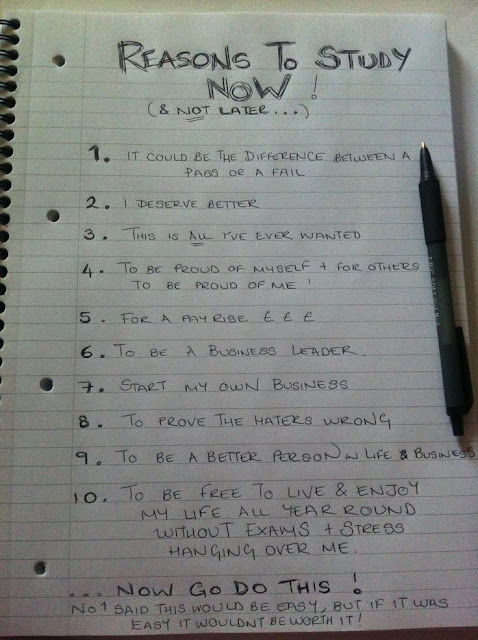When we talk about ‘students’, they get categorized into three category.
The brilliant students, as we know, and everyone's dream. Many time this remains only as a dream because when the time comes to fulfill, we starts giving excuses. Every students are well aware of their heading future, because they know their past results. When past results are not good, a mental setup starts progressing in the mind that the future is still going to be the same.
The brilliant students, as we know, and everyone's dream. Many time this remains only as a dream because when the time comes to fulfill, we starts giving excuses. Every students are well aware of their heading future, because they know their past results. When past results are not good, a mental setup starts progressing in the mind that the future is still going to be the same.
But that's not the truth.
So, as a student, I will suggest you some best study techniques which I do in my day to day life.
Before I start, ask some questions to yourself.
• What is your goal in life?
• How many hours you give yourself to learn something new everyday?
• How many hours you give yourself to learn something new everyday?
(For your knowledge: For the average millionaire, reading can help them grow and learn. In fact, according to research from Thomas Crowley, 85 percent of self-made millionaires read two or more books per month.)
Now, let's start.
Personally, I use Barbara Oakley's method which she had written in her book “A Mind For Numbers”. This is very effective. Once you start doing the following mentioned things, you will get addicted to your studies.
(10 Rules of Good Studying)
By Barbara Oakley, PhD, PE
By Barbara Oakley, PhD, PE
1. Use recall.
After you read a page, look away and recall the main ideas. Highlight very little, and never highlight anything you haven’t put in your mind first by recalling. Try recalling main ideas when you are walking to class or in a different room from where you originally learned it. An ability
to recall—to generate the ideas from inside yourself—is one of the key indicators of good learning.
After you read a page, look away and recall the main ideas. Highlight very little, and never highlight anything you haven’t put in your mind first by recalling. Try recalling main ideas when you are walking to class or in a different room from where you originally learned it. An ability
to recall—to generate the ideas from inside yourself—is one of the key indicators of good learning.
2. Test yourself.
On everything. All the time. Flash cards are your friend.
On everything. All the time. Flash cards are your friend.
3. Chunk your problems.
Chunking is understanding and practicing with a problem solution so that it can all come to mind in a flash. After you solve a problem, rehearse it. Make sure you can solve it
cold—every step. Pretend it’s a song and learn to play it over and over again in your mind, so the information combines into one smooth chunk you can pull up whenever you want. (I will suggest you to do this, it's very effective.)
Chunking is understanding and practicing with a problem solution so that it can all come to mind in a flash. After you solve a problem, rehearse it. Make sure you can solve it
cold—every step. Pretend it’s a song and learn to play it over and over again in your mind, so the information combines into one smooth chunk you can pull up whenever you want. (I will suggest you to do this, it's very effective.)
4. Space your repetition.
Spread out your learning in any subject a little every day, just like an athlete. Your brain is like a muscle—it can handle only a limited amount of exercise on one subject at a time. (Repetition empowers your current knowledge)
Spread out your learning in any subject a little every day, just like an athlete. Your brain is like a muscle—it can handle only a limited amount of exercise on one subject at a time. (Repetition empowers your current knowledge)
5. Alternate different problem‐solving techniques during your practice.
Never practice too long at
any one session using only one problem‐solving technique—after a while, you are just mimicking
what you did on the previous problem. Mix it up and work on different types of problems. This teaches you both how and when to use a technique. (Books generally are not set up this way, so you’ll need to do this on your own.) After every assignment and test, go over your errors, make sure you understand why you made them, and then rework your solutions. To study most effectively, handwrite (don’t type) a problem on one side of a flash card and the solution on the other.
(Handwriting builds stronger neural structures in memory than typing.) You might also photograph
the card if you want to load it into a study app on your smartphone. Quiz yourself randomly on different types of problems. Another way to do this is to randomly flip through your book, pick out a problem, and see whether you can solve it cold.
Never practice too long at
any one session using only one problem‐solving technique—after a while, you are just mimicking
what you did on the previous problem. Mix it up and work on different types of problems. This teaches you both how and when to use a technique. (Books generally are not set up this way, so you’ll need to do this on your own.) After every assignment and test, go over your errors, make sure you understand why you made them, and then rework your solutions. To study most effectively, handwrite (don’t type) a problem on one side of a flash card and the solution on the other.
(Handwriting builds stronger neural structures in memory than typing.) You might also photograph
the card if you want to load it into a study app on your smartphone. Quiz yourself randomly on different types of problems. Another way to do this is to randomly flip through your book, pick out a problem, and see whether you can solve it cold.
6. Take breaks.
It is common to be unable to solve problems or figure out concepts in math or science the first time you encounter them. This is why a little study every day is much better than a lot of
studying all at once. When you get frustrated with a math or science problem, take a break so that
another part of your mind can take over and work in the background.
It is common to be unable to solve problems or figure out concepts in math or science the first time you encounter them. This is why a little study every day is much better than a lot of
studying all at once. When you get frustrated with a math or science problem, take a break so that
another part of your mind can take over and work in the background.
7. Use explanatory questioning and simple analogies.
Whenever you are struggling with a concept, think to yourself, How can I explain this so that a ten‐year‐old could understand it? Using an analogy really helps, like saying that the flow of electricity is like the flow of water. Don’t just think your
explanation—say it out loud or put it in writing. The additional effort of speaking and writing allows you to more deeply encode (that is, convert into neural memory structures) what you are learning.
Whenever you are struggling with a concept, think to yourself, How can I explain this so that a ten‐year‐old could understand it? Using an analogy really helps, like saying that the flow of electricity is like the flow of water. Don’t just think your
explanation—say it out loud or put it in writing. The additional effort of speaking and writing allows you to more deeply encode (that is, convert into neural memory structures) what you are learning.
8. Focus.
Turn off all interrupting beeps and alarms on your phone and computer, and then turn on a
timer for twenty-five minutes. Focus intently for those twenty five minutes and try to work as
diligently as you can. After the timer goes off, give yourself a small, fun reward. A few of these sessions in a day can really move your studies forward. Try to set up times and places where
studying—not glancing at your computer or phone is just something you naturally do.
Turn off all interrupting beeps and alarms on your phone and computer, and then turn on a
timer for twenty-five minutes. Focus intently for those twenty five minutes and try to work as
diligently as you can. After the timer goes off, give yourself a small, fun reward. A few of these sessions in a day can really move your studies forward. Try to set up times and places where
studying—not glancing at your computer or phone is just something you naturally do.
9. Eat your frogs first.
Do the hardest thing earliest in the day, when you are fresh. (This is very important. If you find any subject as a difficult, say Maths, do it earliest in the morning session then go to your favorite topic or subject.)
Do the hardest thing earliest in the day, when you are fresh. (This is very important. If you find any subject as a difficult, say Maths, do it earliest in the morning session then go to your favorite topic or subject.)
10. Make a mental contrast.
Imagine where you’ve come from and contrast that with the dream of
where your studies will take you. Post a picture or words in your workspace to remind you of your
dream. Look at that when you find your motivation lagging. This work will pay off both for you and
those you love!
Imagine where you’ve come from and contrast that with the dream of
where your studies will take you. Post a picture or words in your workspace to remind you of your
dream. Look at that when you find your motivation lagging. This work will pay off both for you and
those you love!
Follow these simple steps and achieve success.
 |
| Reasons to study now. |

Comments
Post a Comment